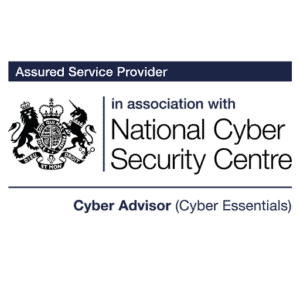Speak to an expert
Speak to an expert
In today’s digital landscape, cyber security is a paramount concern for businesses of all sizes. With cyber threats evolving rapidly, organisations must adopt robust frameworks to safeguard their sensitive information and maintain the trust of their stakeholders. In this blog post, we delve into the popular cyber compliance debate: Cyber Essentials vs ISO 27001, helping you make an informed decision about the most suitable cybersecurity framework for your business.
ISO 27001 and Cyber Essentials are both popular cyber security standards in their own right, providing distinct approaches to addressing the cyber security threat. In the sections below we provide a summary of each followed by a straightforward comparison table and conclusion.
Cyber Essentials is a certification scheme endorsed by the UK government as the baseline standard for cyber security.
It demonstrates a commitment to best practices in IT infrastructure security, focusing on five key areas of control. These are boundary firewalls, secure configuration, access control, malware protection, and patch management. When implemented effectively, these controls protect an organisation’s internet-connected systems from the vast majority of cyber-attacks.

Cyber Essentials has been developed to be universally accessible to all organisations regardless of their size, structure or industry. It can also enhance an organisation’s reputation with UK customers, partners, and regulatory bodies, making it a powerful credential for businesses operating within the UK.
Certification is a mandatory requirement for UK Government contracts and a growing number of UK commercial supply chains seeking to minimise supply chain risk. Some UK-based accreditations, such as the UK Law Society’s Lexcel quality mark, require certification and an increasing number of trade associations, including the British Chamber of Commerce, are recommending or mandating Cyber Essentials.
The certification process for Cyber Essentials has been designed to be streamlined and cost-effective, making it an attractive option for small and medium-sized enterprises (SMEs) looking to establish a strong foundation against common cyber threats.
ISO 27001 is an internationally recognised Information Security Management System (ISMS) standar that demonstrates a commitment to best practices in information governance.
It provides a comprehensive and systematic approach to managing sensitive company information, encompassing; risk management, internal audits, continual improvement, and a broader scope of security controls. For larger enterprises or those with complex information security requirements, ISO 27001 offers a risk-based approach to tailoring their security controls to specific threats and vulnerabilities.
The flexibility of ISO 27001 makes it adaptable to various industries and regulatory environments, providing a more robust defence against sophisticated cyber attacks. That said, depending on an organisation’s starting point, ISO 27001 can be resource-intensive and cost-prohibitive, making it challenging for SMEs to achieve.
That said, the long-term benefits of a robust information security management system may outweigh the initial investment, especially for organisations with a higher risk profile or a need for a globally recognised certification.
ISO 27001 can enhance an organisation’s reputation with customers, partners, and regulatory bodies worldwide, making it a powerful credential for businesses operating on an international scale.
The table below provides an easily digestible comparison of Cyber Essentials and ISO 27001:
| Cyber Essentials | ISO 270001 | |
| IT infrastructure security | Y | N |
| Information governance | N | Y |
| Recognition | UK only | International |
| Enhance reputation | Y | Y |
| Provides access to tenders, supply chains and trade associations | Yes | Yes |
| Cost of certification | Low | High |
| Resource required for implementation | Low/Medium | Medium/High |
On the debate of Cyber Essentials vs ISO 27001 Pete Rucinski, MD of Assure Technical says “In an ideal world, organisations should combine the effective IT security controls of Cyber Essentials with an overarching information security governance framework such as ISO 27001, to achieve the best level of protection from cyber attacks.”
“In reality, cyber security is a journey, not an endpoint. Multiple factors determine the cyber security strategy businesses pursue, including; supply chain and regulatory requirements, strategic goals and commitment to safeguarding sensitive information, budget and resource availability.”
Pete goes on to say, “Prioritising cybersecurity has never been more crucial in building trust and resilience in an increasingly digital world. I would encourage all businesses to seek professional advice in order to ensure that they find the most effective pathway for their business.”
At Assure Technical, our extensive experience and pragmatic approach enable us to provide expert advice and guidance to ensure you take the most appropriate IT compliance journey.
Here are just a few reasons why:
You don’t have to take our word for it – take a moment to read our verified 5* Trustpilot reviews.
Get in touch with us today to book a no-obligation consultation.
Get in touch with our expert consultants for straight-talking, jargon-free technical security advice.











